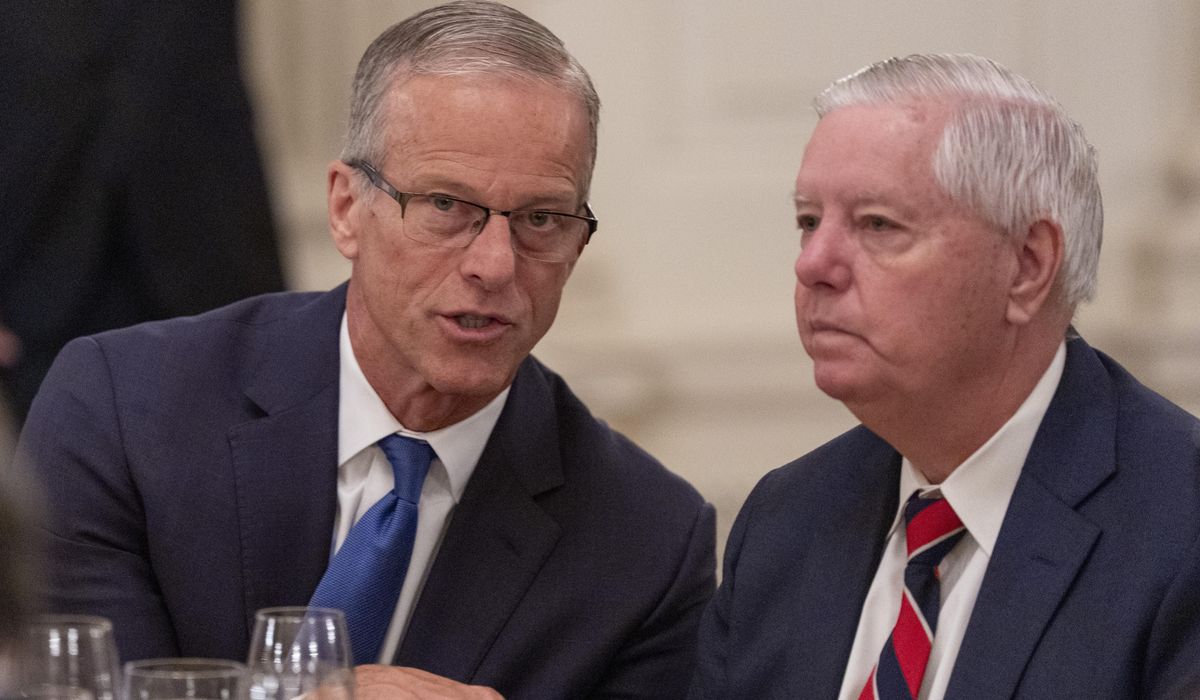


The Senate is beginning to work into its scheduled summer break as a partisan dispute over quickly confirming President Trump’s nominees derailed the planned exit.
Friday was the last day the Senate was scheduled to be in session before the annual August recess.
Instead, the Senate will be in session on Saturday and potentially days and weeks beyond that as the chamber works to confirm more of Mr. Trump’s nominees.
A deal to fast-track nominations remained elusive Friday afternoon as senators finally brokered a unanimous consent agreement on a spending package they also want to pass before the recess.
The spending agreement, which took over a week to broker, set up a series of amendment votes and final passage of three of the 12 fiscal 2026 appropriations bills for Friday evening.
The nominations deal remains more elusive. Senate Majority Leader John Thune said Friday afternoon he had nothing certain to report about the Senate schedule.
“It’s still in flux,” the South Dakota Republican said.
President Trump piled on the pressure with a social media post Thursday night, telling the Senate to stay in Washington until it eliminates the nomination backlog.
“The Senate must stay in Session, taking no recess, until the entire Executive Calendar is CLEAR!!!” Mr. Trump wrote. “We have to save our Country from the Lunatic Left. Republicans, for the health and safety of the USA, do your job, and confirm All Nominees. They should not be forced to wait.”
The executive calendar features more than 150 nominees that have been reported out of committee and are awaiting a floor vote.
If the Senate were to confirm all those nominees through regular order, it would effectively require the chamber to give up its entire August break.
“That would bum me out, but I would do it,” Sen. Cynthia Lummis, Wyoming Republican, told The Washington Times.
Ms. Lummis and other Republicans said they’re still hoping Democrats will agree to a deal to fast-track some of the nominations.
“What that number is, it’s got to be an agreement between all sides to be able to get it done,” Sen. James Lankford, Oklahoma Republican, said. “But we need more done. We got to get more done. We’re behind.”
Given the president’s demands, Mr. Thune has arranged for the White House to negotiate directly with Senate Minority Leader Charles E. Schumer, New York Democrat, to see if there’s a deal they can hash out.
Republicans have accused Democrats of engaging in unprecedented obstruction as they’ve refused to allow any of Mr. Trump’s second-term nominees – except for military promotions – to be quickly confirmed by voice vote or unanimous consent.
Democrats have not closed the door to such a deal but have made clear they won’t sign off on fast-tracking nominees – something that requires agreement from all 100 senators – without concessions.
“The Republicans are in charge. If they want Democratic cooperation, then they need to offer the Democrats something other than do it my way or the highway,” said Sen. Elizabeth Warren, Massachusetts Democrat.
She declined to say what her party would want, noting the onus is on the GOP to make some offers.
“I don’t think I can generalize about what we would accept or not,” Sen. Richard Blumenthal, Connecticut Democrat, said.
“The nominees that we have right now are, by and large, unqualified, so I’m not going to voice vote them,” he said. “We have a responsibility to cast votes and to be accountable on the record, so my strong preference is to have roll call votes.”
It’s that reticence from Democrats to compromise that has Republicans considering hardball tactics for pushing Mr. Trump’s nominees through.
“I’m committed to anything we could do to get it done, including breaking the Democrats on this,” Sen. Eric Schmitt, Missouri Republican, said. “Because this has never happened in the history of the country.”
Breaking the Democrats’ blockade, he said, could mean allowing recess appointments or changing the Senate rules.
Republicans could use the “nuclear option” to change the Senate rules without Democrats’ cooperation. One option, Mr. Schmitt said, would be reducing debate time on each nominee from 2 hours to 10 minutes.
Allowing Mr. Trump to make recess appointments may be the more difficult option because it would require the House, which has already left Washington for its summer break, to come back and work with the Senate to pass a concurrent resolution allowing the chambers to adjourn for more than three days.
The Supreme Court has said Congress must adjourn for at least 10 days for a president to make recess appointments, and the House is currently holding pro forma sessions every three days.
• Lindsey McPherson can be reached at lmcpherson@washingtontimes.com.
